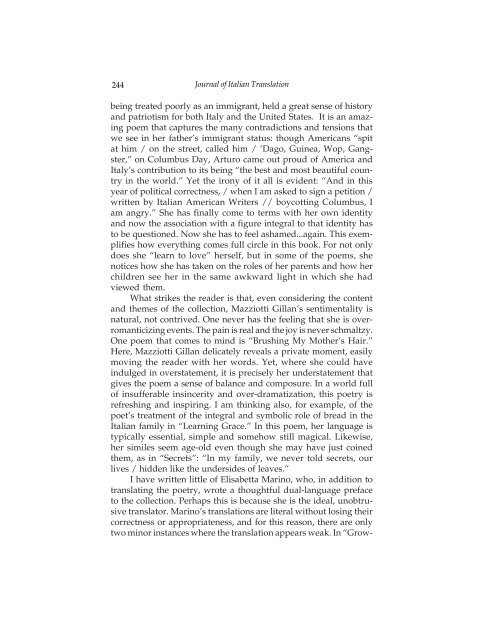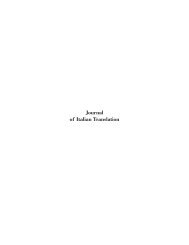Journal of Italian Translation - Brooklyn College - Academic Home ...
Journal of Italian Translation - Brooklyn College - Academic Home ...
Journal of Italian Translation - Brooklyn College - Academic Home ...
You also want an ePaper? Increase the reach of your titles
YUMPU automatically turns print PDFs into web optimized ePapers that Google loves.
244<br />
<strong>Journal</strong> <strong>of</strong> <strong>Italian</strong> <strong>Translation</strong><br />
being treated poorly as an immigrant, held a great sense <strong>of</strong> history<br />
and patriotism for both Italy and the United States. It is an amazing<br />
poem that captures the many contradictions and tensions that<br />
we see in her father’s immigrant status: though Americans “spit<br />
at him / on the street, called him / ‘Dago, Guinea, Wop, Gangster,”<br />
on Columbus Day, Arturo came out proud <strong>of</strong> America and<br />
Italy’s contribution to its being “the best and most beautiful country<br />
in the world.” Yet the irony <strong>of</strong> it all is evident: “And in this<br />
year <strong>of</strong> political correctness, / when I am asked to sign a petition /<br />
written by <strong>Italian</strong> American Writers // boycotting Columbus, I<br />
am angry.” She has finally come to terms with her own identity<br />
and now the association with a figure integral to that identity has<br />
to be questioned. Now she has to feel ashamed...again. This exemplifies<br />
how everything comes full circle in this book. For not only<br />
does she “learn to love” herself, but in some <strong>of</strong> the poems, she<br />
notices how she has taken on the roles <strong>of</strong> her parents and how her<br />
children see her in the same awkward light in which she had<br />
viewed them.<br />
What strikes the reader is that, even considering the content<br />
and themes <strong>of</strong> the collection, Mazziotti Gillan’s sentimentality is<br />
natural, not contrived. One never has the feeling that she is overromanticizing<br />
events. The pain is real and the joy is never schmaltzy.<br />
One poem that comes to mind is “Brushing My Mother’s Hair.”<br />
Here, Mazziotti Gillan delicately reveals a private moment, easily<br />
moving the reader with her words. Yet, where she could have<br />
indulged in overstatement, it is precisely her understatement that<br />
gives the poem a sense <strong>of</strong> balance and composure. In a world full<br />
<strong>of</strong> insufferable insincerity and over-dramatization, this poetry is<br />
refreshing and inspiring. I am thinking also, for example, <strong>of</strong> the<br />
poet’s treatment <strong>of</strong> the integral and symbolic role <strong>of</strong> bread in the<br />
<strong>Italian</strong> family in “Learning Grace.” In this poem, her language is<br />
typically essential, simple and somehow still magical. Likewise,<br />
her similes seem age-old even though she may have just coined<br />
them, as in “Secrets”: “In my family, we never told secrets, our<br />
lives / hidden like the undersides <strong>of</strong> leaves.”<br />
I have written little <strong>of</strong> Elisabetta Marino, who, in addition to<br />
translating the poetry, wrote a thoughtful dual-language preface<br />
to the collection. Perhaps this is because she is the ideal, unobtrusive<br />
translator. Marino’s translations are literal without losing their<br />
correctness or appropriateness, and for this reason, there are only<br />
two minor instances where the translation appears weak. In “Grow-
















